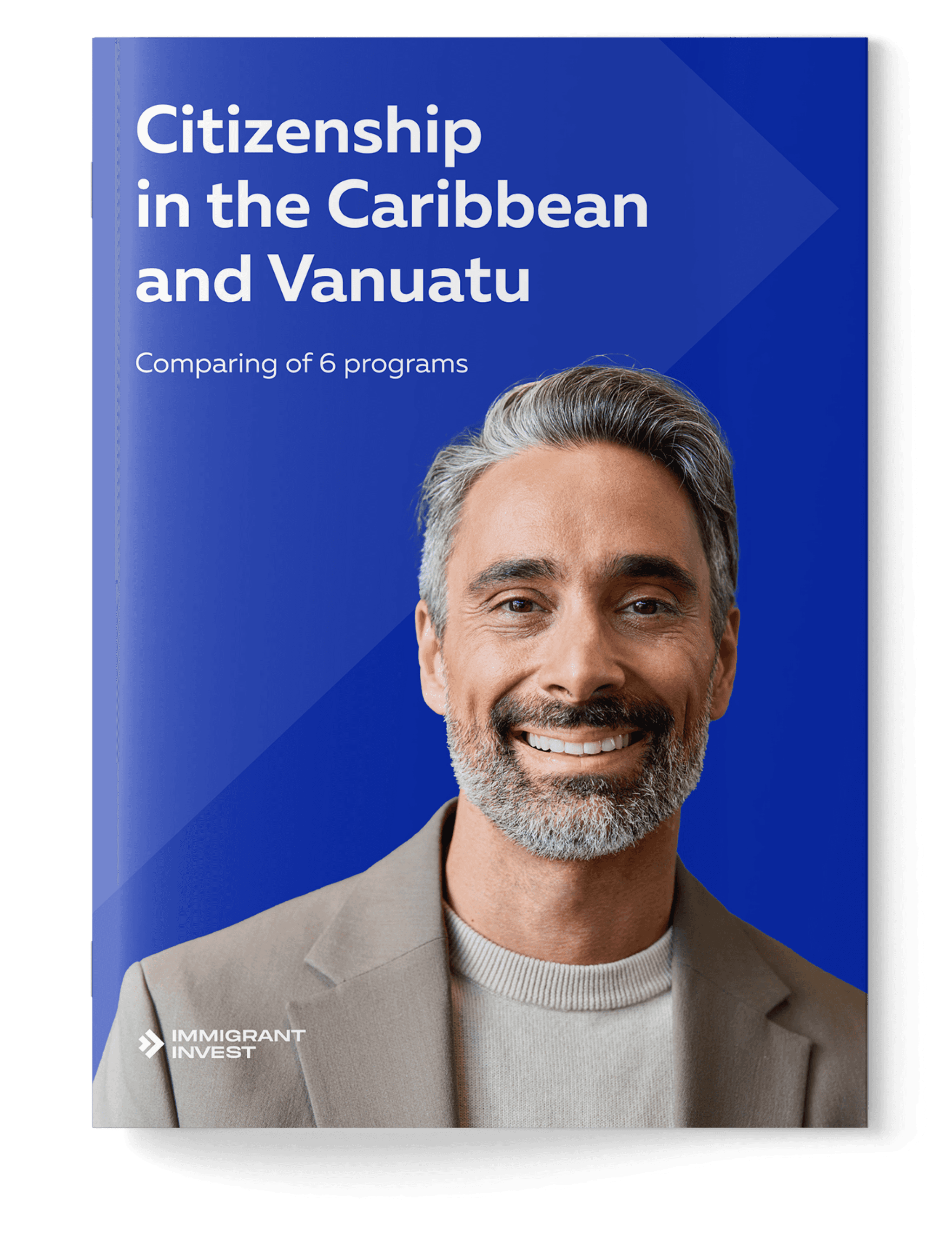How to get Caribbean citizenship by investment in real estate
Caribbean nations make good "Plan B" countries. They offer tax optimisation, convenient business opportunities, profitable real estate, a comfortable life in a tropical climate, and more.
A minimum contribution of $200,000 can make investors and their families Caribbean nationals. If an investor chooses to purchase real estate, they can earn a profit. Opportunities differ from island to island, — but all Caribbean citizenship programs conveniently have common features.

Author •Elena Ruda
Explains how to invest in Caribbean real estate and get citizenship

How to get Caribbean citizenship by investment in real estate
What is Caribbean citizenship by investment?
Only five Caribbean countries offer citizenship by investment: Antigua and Barbuda, Grenada, Dominica, Saint Kitts and Nevis, and Saint Lucia. Becoming a Caribbean citizen means obtaining a passport from one of these countries by contributing to the economy. The minimum investment sum is $200,000.
Caribbean citizenship programs are government-sanctioned and secure, with an excellent global reputation. Dominica, Saint Kitts and Nevis, and Saint Lucia investment programs are ranked the best in the global Citizenship by Investment Index edition.
7 benefits of a Caribbean passport
1. Travel mobility. Caribbean citizens can visit more than 140 countries visa-free. This includes the Schengen Area, the UK, Hong Kong, and Singapore. Citizens of Grenada, Antigua and Barbuda, and Dominica can also enter China without visas.
2. Long-term US visas. Caribbean citizens can obtain a B‑1/B‑2 visitor visa in 2—3 weeks; the visa is issued for 10 years. Grenada citizens can get an E‑2 investor visa and open a company in America.
3. International banking access. Caribbean citizens can open accounts in European and Commonwealth banks with more ease. Foreigners are usually asked to submit more documents to open a bank account, and only some Caribbean banks work with non-residents.
4. Tax optimisation. For Caribbean citizens, there are no inheritance or capital gain taxes.
Taxation varies from state to state, but the systems are generally favourable. A few examples: St Kitts and Nevis and Antigua and Barbuda have no income tax. Individuals won’t pay property transfer taxes in Grenada, St Kitts and Nevis, and Antigua and Barbuda.
5. Global education opportunities. All Caribbean states with citizenship programs are members of the British Commonwealth of Nations. Caribbean students can obtain grants and other benefits for studying in Commonwealth countries, including the UK.
6. Keeping the first passport. Dual citizenship is permitted in the Caribbean states with investment programs. This means that Caribbean nationals who hold citizenship of another country, or countries, don’t have to renounce it.
7. "Plan B". Citizens can move to the Caribbean at any time, even if the borders are closed.
All Caribbean countries that offer citizenship by investment are island states. They are surrounded by the Caribbean Sea and are the definition of a tropical paradise.

Dominica is one of the quietest Caribbean countries to live in. It’s ¾ rainforests and nature reserves, and the rest is colourful and cosy towns
Requirements for Caribbean citizenship by investment program applicants
When applying for Caribbean citizenship, there are no condition differences for European Union and non-European Union citizens.
The investor is considered the primary applicant. The requirements for them include the following:
age over 18;
no criminal record;
legal income;
funds for the investment conditions fulfilment;
good health.
Family members. The investor can include their family in the application: their spouse, parents, and children under 18, as well as disabled children of any age.
Different Caribbean states have different rules for that. For example, in Antigua and Barbuda, non-disabled adult children must be no older than 30. The investor’s parents must be at least 65 in Dominica and 55 in Antigua and Barbuda.
The investor’s siblings can’t be included in Dominica, and the investor’s grandparents can’t be included in Saint Kitts and Nevis.
All family members, except for the spouse, children under 18, or disabled children of any age, must be financially dependent on the investor.
Benefits of real estate options in the Caribbean citizenship program
There are two to five investment options across all Caribbean citizenship programs. The real estate option is presented in all of them.
Available real estate includes government-approved projects; depending on the country, it can be villas, tourist accommodations, hotels, resorts, and even yacht marinas.
Investors buy shares or obtain full ownership.
Affordability. The minimum investment requirement for Caribbean real estate starts at $200,000. Investors who want to become Caribbean citizens are exempt from additional expenses: for example, they don’t have to buy an Alien Land Holding License.
In Caribbean real estate investment, the minimum amount doesn’t depend on the number of applicants. However, the state fee will be different for single applicants and those applying with families.
Real estate expenses in the Caribbean by country
Profitability. Investors can earn money on the purchased property. Residential and commercial investment property in the Caribbean can be rented out and operated for profit. Annual yield is usually 3—5%.
Convenience. Management companies handle most investment properties. Thus, investors don’t have to search for tenants and look after real estate while earning passive income.
Liquidity. Investors can resell their property in 3—7 years and return the investment.
Some Caribbean states impose restrictions on property types for investors. For example, in Antigua and Barbuda, a property can only participate in a citizenship program twice, and Dominica doesn’t allow buying land plots to construct custom houses or marinas.
Such nuances, as well as the legality of a property that an investor wants to purchase, can be confirmed by a licensed real estate agent.
Examples of properties in Dominica
How to obtain Caribbean citizenship by investment in real estate
Four steps lead to Caribbean citizenship by investment. The whole process usually takes 6—8+ months.
Contacting a licensed program agent
The agent runs the preliminary Due Diligence checks with the investor and other applicants and helps prepare the documents. This can be done remotely. You can’t apply for a Caribbean citizenship program directly.
The agent runs the preliminary Due Diligence checks with the investor and other applicants and helps prepare the documents. This can be done remotely. You can’t apply for a Caribbean citizenship program directly.
Passing Due Diligence
The lawyers at Immigrant Invest submit the documents to the Citizenship by Investment Unit of the chosen Caribbean country. The unit studies the documents and runs its own Due Diligence check.
The lawyers at Immigrant Invest submit the documents to the Citizenship by Investment Unit of the chosen Caribbean country. The unit studies the documents and runs its own Due Diligence check.
Choosing a real estate property in the Caribbean and fulfilling the investment condition
The investor chooses a government-approved property in the Caribbean, enters into a preliminary agreement, and buys the property when their citizenship application is approved.
This, too, can be done remotely with the assistance of the Immigrant Invest real estate team.
The investor chooses a government-approved property in the Caribbean, enters into a preliminary agreement, and buys the property when their citizenship application is approved.
This, too, can be done remotely with the assistance of the Immigrant Invest real estate team.
Getting a Caribbean passport
In 2—6 months, after investment conditions are fulfilled, the country issues passports for the investor and other applicants.
In 2—6 months, after investment conditions are fulfilled, the country issues passports for the investor and other applicants.
Other investment options in the Caribbean
The state fund contribution is a non-refundable investment option. The minimum investment is:
$200,000 in Dominica;
$230,000 in Antigua and Barbuda;
$235,000 in Grenada;
$240,000 in St Lucia;
$250,000 in St Kitts and Nevis.
$100,000+
Fund contribution amount in the Caribbean countries
The contribution to a higher education institution is a non-refundable option available in Antigua and Barbuda. Only families of six or more can choose this option. The minimum investment is $260,000.
Government bonds purchase is a refundable investment option available in St Lucia. The minimum investment is $300,000. But after December 31st, 2022, it will be $500,000.
Business investment is a refundable option available in St Lucia and Antigua and Barbuda. The minimum investment starts at $1,000,000 in St Lucia and $400,000 in Antigua and Barbuda. In St Lucia, applicants can also invest at least $250,000 in government-approved infrastructure projects.
Key points about Caribbean citizenship by real estate investment
Investors can obtain citizenship by property purchase in five Caribbean countries: Antigua and Barbuda, Grenada, Dominica, St Kitts and Nevis, and St Lucia. The minimum investment amount is $200,000.
The investment property is a liquid asset that can be resold in 3—7 years to return the investment.
Other investment options in the Caribbean include contributions to a state fund, donations to a higher education institution in Antigua and Barbuda, the purchase of government bonds in St Lucia. The business investments are available in St Lucia and Antigua and Barbuda. The investment threshold is $200,000.
Caribbean passport allows investors to travel visa-free to more than 140 countries, optimise taxes, obtain long-term visas to the USA, and open accounts in European and Commonwealth banks with greater ease.
An investor’s family members are eligible for Caribbean passports. A spouse, minor children, and investor’s parents can be added in the application in all five countries.
Immigrant Invest is a licensed agent for citizenship and residence by investment programs in the EU, the Caribbean, Asia, and the Middle East. Take advantage of our global 15-year expertise — schedule a meeting with our investment programs experts.
Frequently asked questions
Case studies

Antigua and Barbuda as a 4th citizenship: starting a business in the Caribbean

How to get a tourist visa to the USA for 10 years with the Antigua and Barbuda passport

Antigua and Barbuda citizenship for plans in the UK: studies, work, travel




















